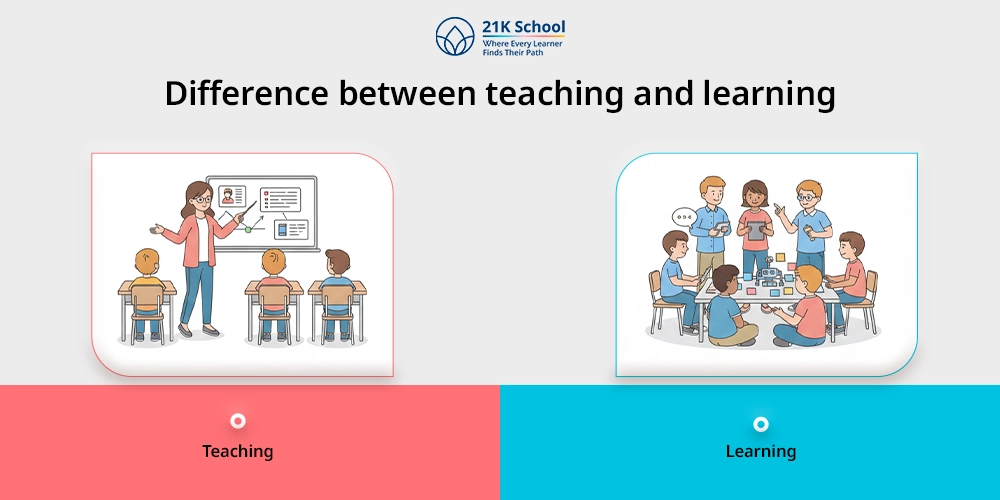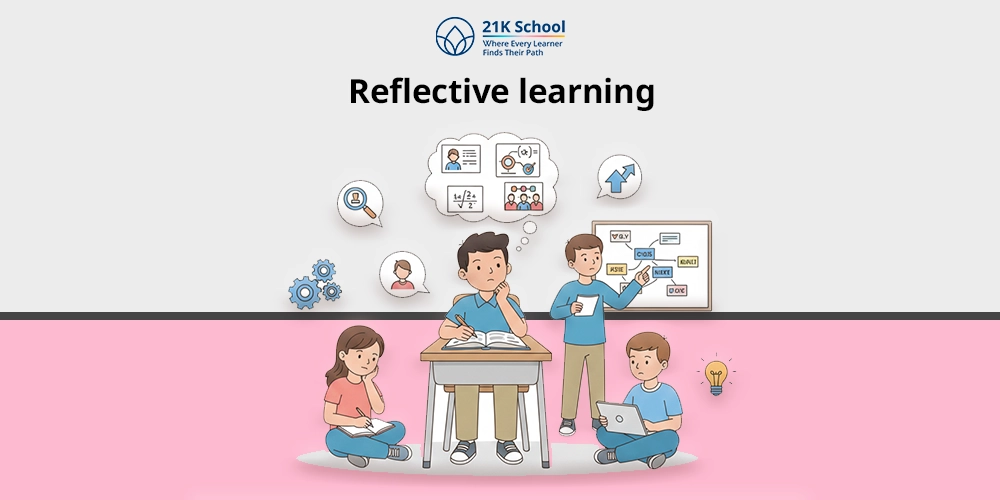
The educational alternative of homeschooling has gained substantial popularity in the past decades. But still, parents and teachers experience doubt concerning social development when they opt to homeschool their children.
Here are the best things that parents should know about homeschooling to rejuvenate their belief in it. And support their children in the right decision-making about their educational preferences.
Experts claim that homeschooling may create barriers. And if you are thinking it would be barriers in their thought processes, you are wrong.
Stigma prevails that children won’t be able to master important social abilities because they lack enough contact with peers.
But reality tells another story. The paper evaluates homeschooling, addressing social development, debarring misconceptions for approaching support for academic and communal growth of homeschooled students.
Contents
- Homeschooling And Socialization
- Homeschooling and Socialization: How Does it Work?
- How to Socialize a Homeschooled Child?
- Common Myths About Homeschooling and Social Skills
- Key Social Benefits of Homeschooling
- Challenges of Socialization in Homeschooling
- Strategies to Improve Social Interaction for Homeschooled Kids
- Comparing Social Skills: Homeschooled vs. Traditionally Schooled Children
- Final Thoughts
Homeschooling And Socialization
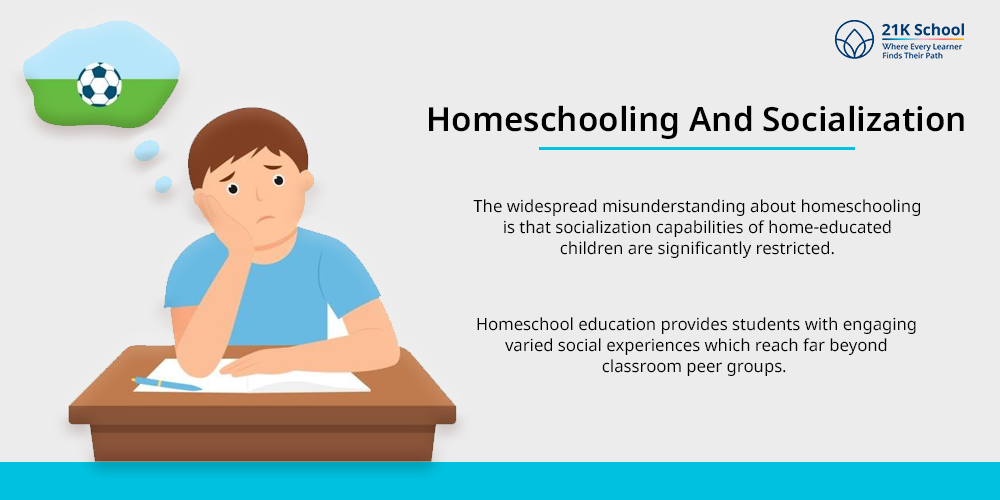
The widespread misunderstanding about homeschooling is that socialization capabilities of home-educated children are significantly restricted.
The majority of critics believe home education cuts off children from social settings which exist in real outside environments.
Traditional classroom environments do not define the spaces where students learn social skills. Homeschool education provides students with engaging varied social experiences which reach far beyond classroom peer groups.
Homeschooled children find social opportunities through their interactions with siblings and parents.
Belonging to homeschool co-ops, clubs, sports teams, arts programs, and volunteer work create deep interpersonal bonds for participating families.
Studies demonstrate that homeschooling leads students to build excellent communication abilities and emotional maturity. Self-assurance is another feature developed through their frequent social interactions with people from different age ranges and demographic backgrounds.
Parents need to actively build social settings for their children through homeschooling. This structured environment lets families select wholesome experiences and blocks abusive behavior from peers like bullying.
Homeschooling does not avoid socialization but changes students’ approach to connecting with others in positive life-shaping ways.
Thoughtfully implemented homeschooling creates a balanced educational space which develops essential social skills for both life, and future professions.
Homeschooling and Socialization: How Does it Work?
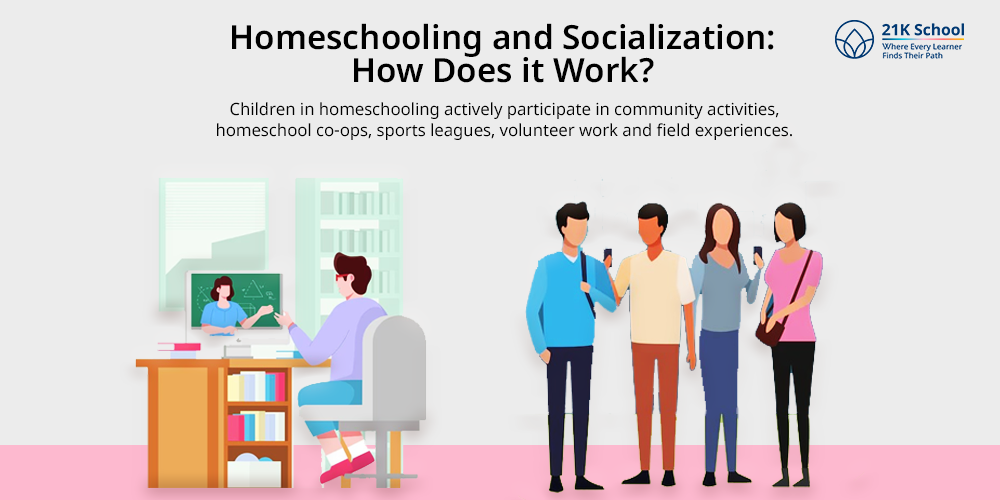
Children acquire knowledge about social norms, learn how to connect with others, and establish relationships by practicing socialization.
The process of socialization between students takes place spontaneously during classroom time, playground activities, and after-school clubs in traditional schools.
Homeschooling curriculum exists as an educational method which rejects the recognized myth of seclusion. Most homeschooling families participate in planned social events that happen outside their residence.
Children in homeschooling actively participate in community activities, homeschool co-ops, sports leagues, volunteer work and field experiences.
Homeschooled students frequently join online learning opportunities through discussion platforms that connect them to peers across the globe.
Under homeschooling, parents have the advantage of choosing interaction settings for their children. While also, providing protection from detrimental social elements like bullying.
A scholar’s social upbringing strongly depends on active participation of parents when their children learn from home. Homeschooled children typically interact with broader age groups that lead to the development of advanced interpersonal abilities.
How to Socialize a Homeschooled Child?
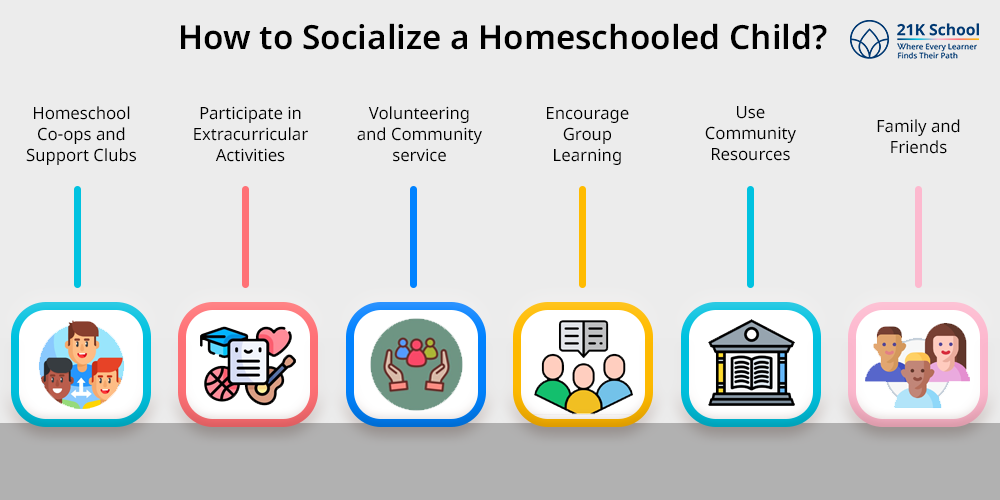
Planning ahead helps homeschool parents to effectively socialize their children, resulting in enriching social interactions. These methods will help homeschooled children achieve robust social development:
- Homeschool Co-ops and Support Clubs: Homeschool co-ops and support groups arrange learning events, classroom programs, excursions and social functions for students.
Children receive ordinary social exposure and lifelong learnings through peer group activities at these support groups.
- Participate in Extracurricular Activities: Multiple extracurricular activities such as dance, drama, music and art, and sports create ideal opportunities for socialization.
Playing football or other high spirit sports activities can build student’s leadership qualities, and conflict resolution techniques.
Learn other uses and importance of extracurricular activities for student’s development and encourage them to participate more often.
- Volunteering and Community service: Participation in community service enables people to understand others while learning team working abilities and develop civic responsibilities.
The involvement of children in local community events like food distribution programs, or visits to senior homes helps them join the larger social fabric.
- Encourage Group Learning: The digital realm helps users maintain contacts through platforms which re-create the basics of classroom sessions and encourage collaborative learning.
Online educational activities like debates, book clubs, and science fairs maintain students’ active learning, allowing connection with classmates.
- Use Community Resources: Local libraries, museums, and community centers schedule many events which children can attend.
Educational camps as well as workshops and language classes combine educational value with social activities.
- Family and Friends: The social growth of children gets promoted through quality time, they spend with their family members and friends. The hosting of both playdates and sleepovers creates equal social advantages for children.
Homeschooling children develop different social activities through their schedules. They enjoy social encounters on par with what traditional school students experience.
Common Myths About Homeschooling and Social Skills
Various misconceptions of homeschooling exist, which affect its influence on social growth for children. Understanding some frequently held incorrect beliefs about homeschool education is crucial.
Myth: Homeschooled Children Experience Isolation
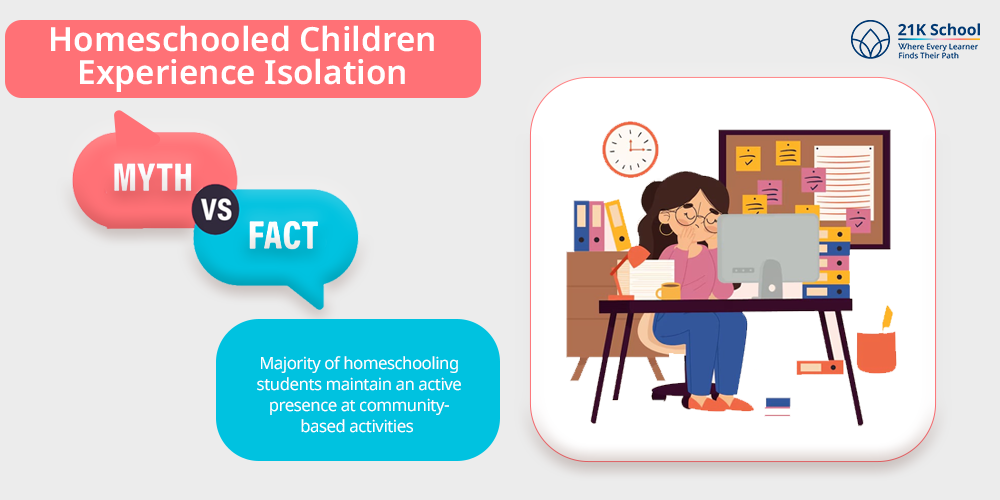
- Reality: The majority of homeschooling students maintain an active presence at community-based activities with structured cooperative groups. Their social obligations fill up their schedule similarly to how a typical student maintains their social activities.
Myth: Homeschoolers Can’t Handle Group Settings
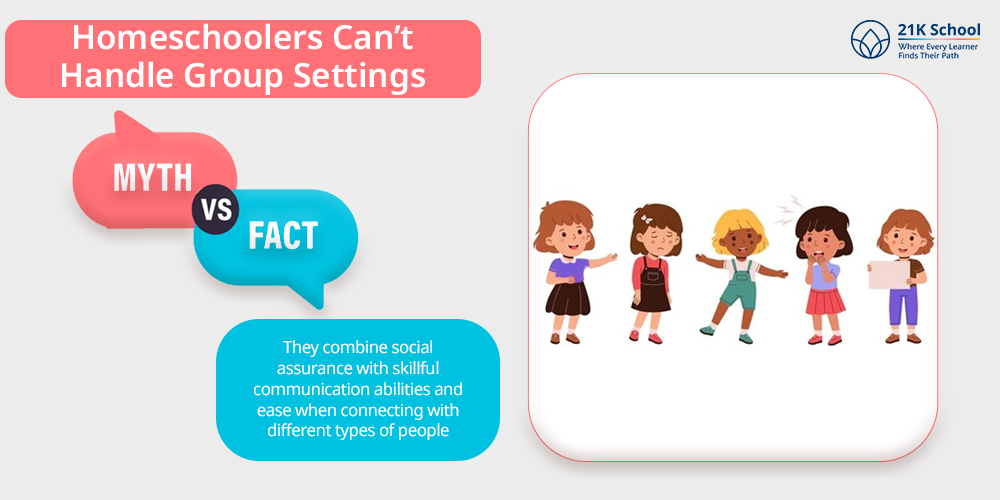
- Reality: Students who learn at home engage with children of various ages through which they learn communication techniques serving multiple situations. Children from homeschooling backgrounds combine social assurance with skillful communication abilities and ease when connecting with different types of people.
Myth: Homeschooling Bears Under-confidence
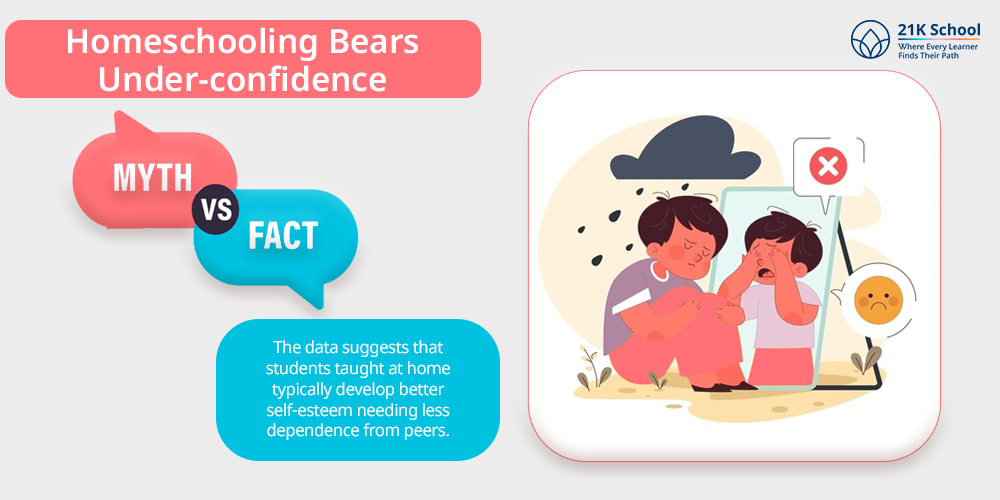
- Reality: Studies indicate that homeschooled students develop identical social abilities as traditional school students. The data suggests that students taught at home typically develop better self-esteem needing less dependence from peers.
Myth: Homeschooling Ignores Conflict Resolution
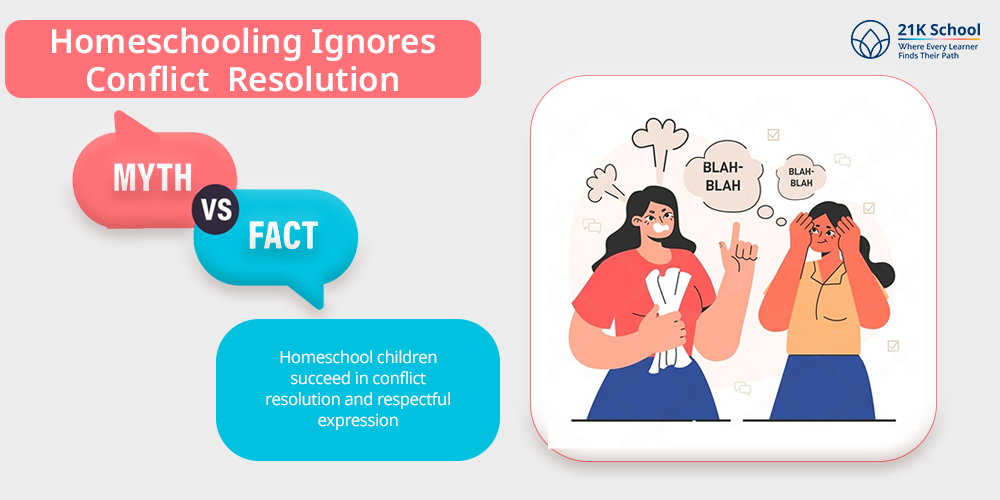
- Reality: Homeschool children succeed in conflict resolution and respectful expression. They do it through participation in supervised group activities, and family and community engagements.
Myth: Kids Miss Out on ‘Real Life’
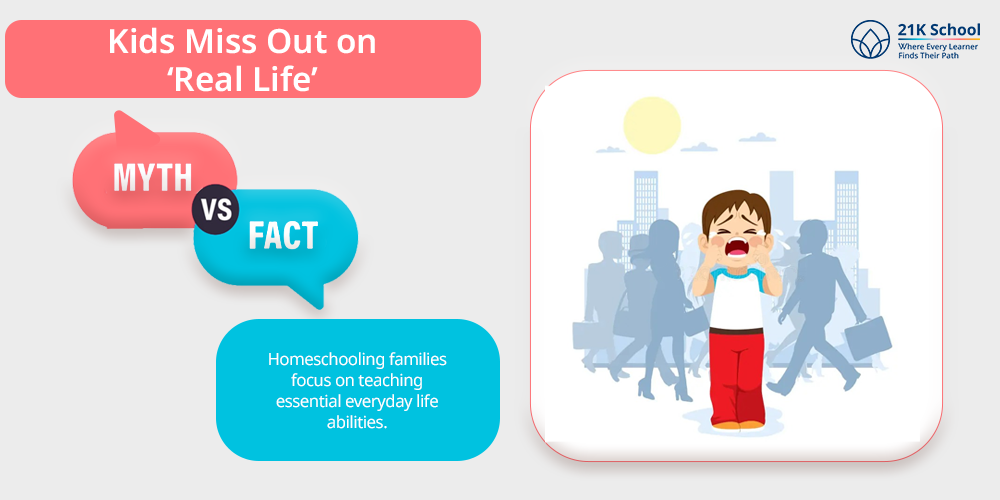
- Reality: Homeschooling families focus on teaching essential everyday life abilities. When children learn budgeting, cooking, and time organization, they already get enough resources for living a great life ahead.
Key Social Benefits of Homeschooling
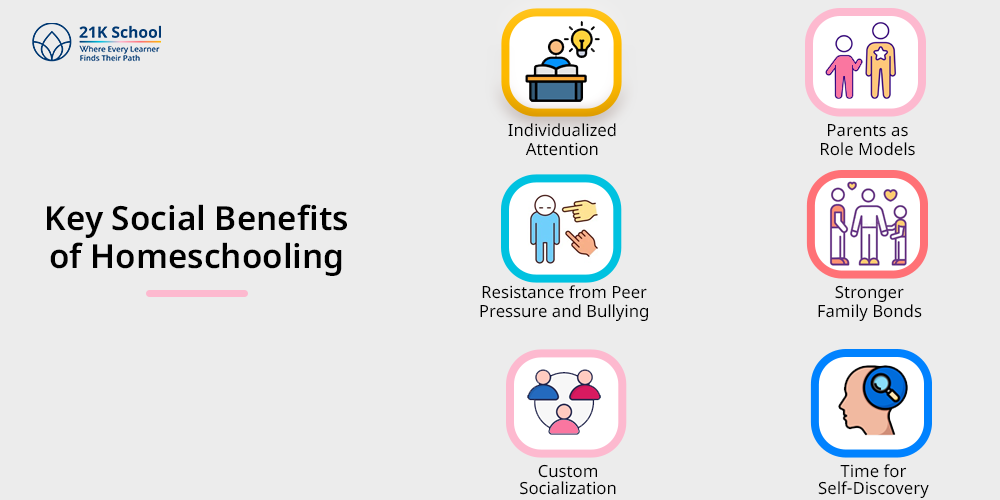
The social benefits of homeschooling constitute a special set of advantages which might not be available in traditional school settings.
- Individualized Attention: Children obtain better learning experiences when mentors and family members focus on their academic development.
- Parents as Role Models: Children who are schooled at home learn from responsible adults as social examples which leads to their social development.
- Resistance from Peer Pressure and Bullying: The controlled social environments in home-based education protect students from experiencing peer-related negative influences.
- Stronger Family Bonds: Spending more time with family fosters emotional security, communication, and empathy within the home.
- Custom Socialization: Children who receive their education at home develop broader social skills. This is because they meet various age groups and types of individuals with different cultural backgrounds.
- Time for Self-Discovery: Self-exploration becomes possible through homeschooling since it teaches children emotional intelligence while developing dependence on ownself.
Challenges of Socialization in Homeschooling
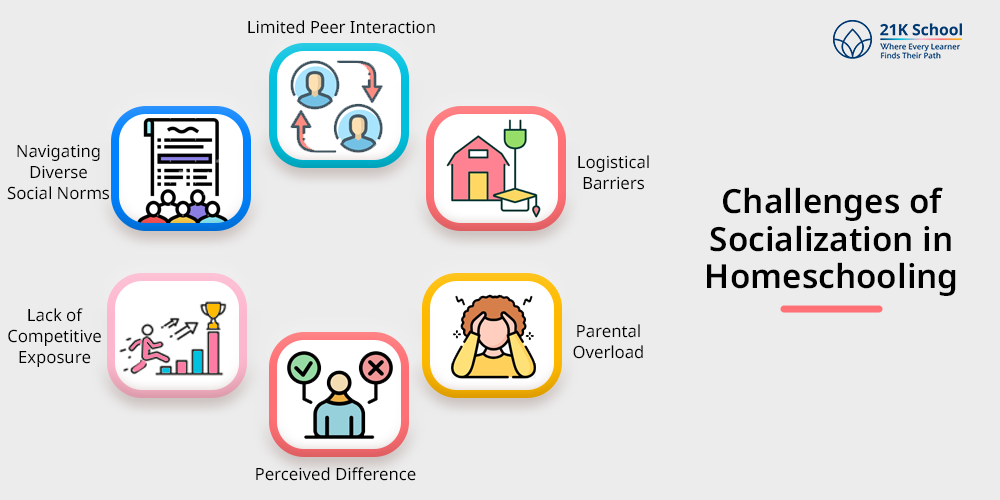
The socialization limitations which homeschooling presents main amongst them are thought to be:
- Limited Peer Interaction: Unintentional lack of daily peer connections becomes a concern for homeschooled children who do not learn team management.
- Logistical Barriers: Rural parents face practical barriers to discover homeschool groups and local activities that exist near their homes.
- Parental Overload: Parents face excessive pressure because they manage schoolwork with social activities while handling household chores. This creates overwhelming situations.
- Perceived Difference: Children who receive homeschool education may develop feelings of dissimilarity toward normally schooled peers after entering public spaces.
- Lack of Competitive Exposure: Homeschoolers often lack the chance to participate in healthy competitive settings including academic contests and school sports.
- Navigating Diverse Social Norms: Homeschool students experience limited contact with diverse social conventions because they lack a typical school peer environment.
Strategies to Improve Social Interaction for Homeschooled Kids
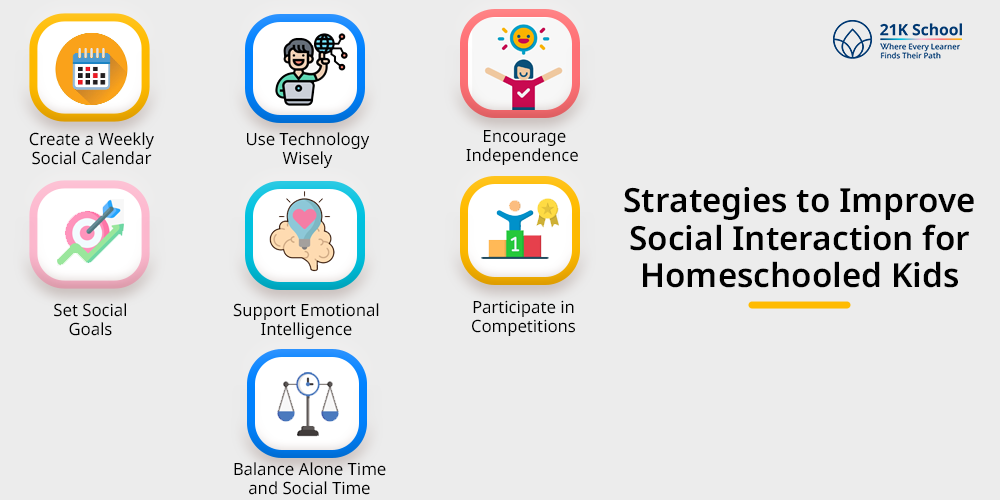
Let’s take a collective step in solving the disadvantages of homeschooling. The following strategies allow homeschoolers to address their social challenges:
- Create a Weekly Social Calendar: Establish a weekly schedule of joint events that includes educational co-op activities together with group play sessions. A structured social schedule provides regular interpersonal events to students.
Parents can learn tips for creating a homeschooling schedule for their children, so that they ace in every field of success.
- Use Technology Wisely: Online platforms under moderation should be used by your child as a safe way to engage globally with others. Especially those who share similar interests.
- Encourage Independence: You should help your child learn how to start interactions alone while presenting themselves properly and sharing their thoughts. Executing role-based social situations helps people learn how to socialize.
- Set Social Goals: Social goals are important. As a team you can establish particular relationship objectives, including getting a new friend or helping with team assignments.
- Support Emotional Intelligence: Your child’s emotional development requires constructive dialogue about feelings and emotional abilities through text or therapeutic counseling sessions.
Read social emotional learning for better insights on the same and encourage the development of their psychological intelligence.
- Participate in Competitions: Local contests of spelling bees, quizzes, and science fairs will help your child in building confidence and gain practical experience.
- Balance Alone Time and Social Time: Healthy social development occurs when people treat personal space with respect. Children should have a sense of stability between time given to others and their own self-care.
Comparing Social Skills: Homeschooled vs. Traditionally Schooled Children
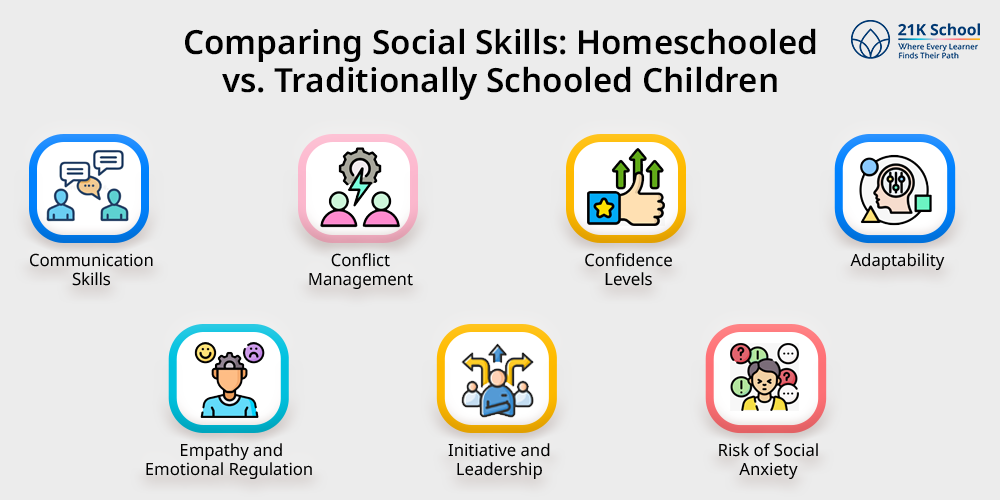
A quick and easy to understand table comparing the social skills of homeschooled vs. traditionally schooled children:
| S.No. | Particulars | Homeschooled Children | Traditionally Schooled Children |
| 1. | Communication Skills: | Homeschooled children have stronger communication with adults due to regular interaction at home. | Traditionally schooled children are more peer-focused in communication with classmates. |
| 2. | Conflict Management: | Here conflicts are parent-guided and managed in a controlled environment. | Traditionally schooled children showcase frequent unplanned peer conflicts. It offers more natural learning experiences. |
| 3. | Confidence Levels: | Generally homeschooled children are seen as having higher confidence due to a supportive and encouraging home environment. | On the other hand, confidence levels vary in this case. It may be affected by peer pressure or competitive settings. |
| 4. | Adaptability: | Adapt well across age groups; more flexible in varied social settings. | Adjust better in structured large-group environments like classroom settings. |
| 5. | Empathy & Emotional Regulation: | Homeschooled children have stronger emotional regulation through open emotional discussions at home. | However, in traditionally schooled children emotional regulation skills develop through social challenges and peer interactions. |
| 6. | Initiative & Leadership: | High levels of initiative taken by homeschooled children due to self-directed learning and co-op involvement. | In this case, leadership often develops through school activities such as group projects or clubs etc. |
| 7. | Risk of Social Anxiety: | It doesn’t show any significant difference; often lower due to reduced exposure to bullying and pressure. | Traditionally schooled children may face more social stress from peer dynamics, bullying, or strict social norms. |
Students demonstrate different social skill abilities based on environmental conditions together with their personal traits. Let’s break it down:
- Communication Skills: The unusual interaction between homeschoolers produces enhanced communication skills with adults due to their frequent contact with them. Traditional school students generally express their communication skills with other students.
- Conflict Management: Traditional educational settings create more unplanned conflicts. Besides that, homeschooling allows parents to manage conflicts through their guidance.
- Confidence Levels: Homeschool students generally present confident postures. This is because the supportive and friendly educational setup at their home motivates them.
- Adaptability: Traditional school children seem to adjust more promptly to the social structures of big groups when compared to homeschooled students. While, homeschooled students demonstrate superior adaptation ability when they interact with others of different ages in social settings.
- Empathy and Emotional Regulation: Homeschooled children develop better emotional regulation skills through their homeschooling experience which promotes emotional conversations.
- Initiative and Leadership: Self-directed projects and co-ops at homeschool usually develop within students a strong foundation of initiative along with leadership abilities.
- Risk of Social Anxiety: Scientific research shows that homeschoolers neither display more nor less tendencies toward social anxiety. In fact, many experience less stress due to absence of bullying and rigid social hierarchies.
Learn more on homeschooling vs traditional-schooling.
Final Thoughts
The practice of homeschooling exists independently from social development activities.
Homeschooled children who need specific social arrangements for development still gain different intricate paths to emotional, intellectual, and social maturity.
Through deliberate homeschooled education and the societal backing with modern available resources students learn interpersonal skills.
This surprisingly maintains or even surpasses traditional classroom learning outcomes.
Quality takes precedence over quantity when it comes to socialization.
Homeschooling produces emotionally mature and well-adjusted students who interact productively with their environment when approached thoughtfully.

